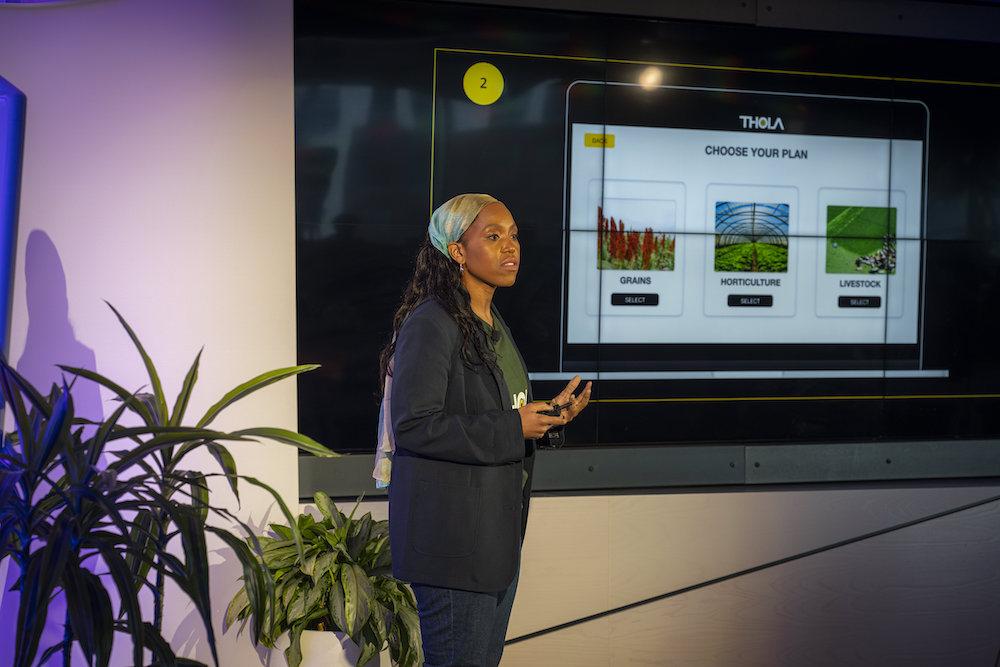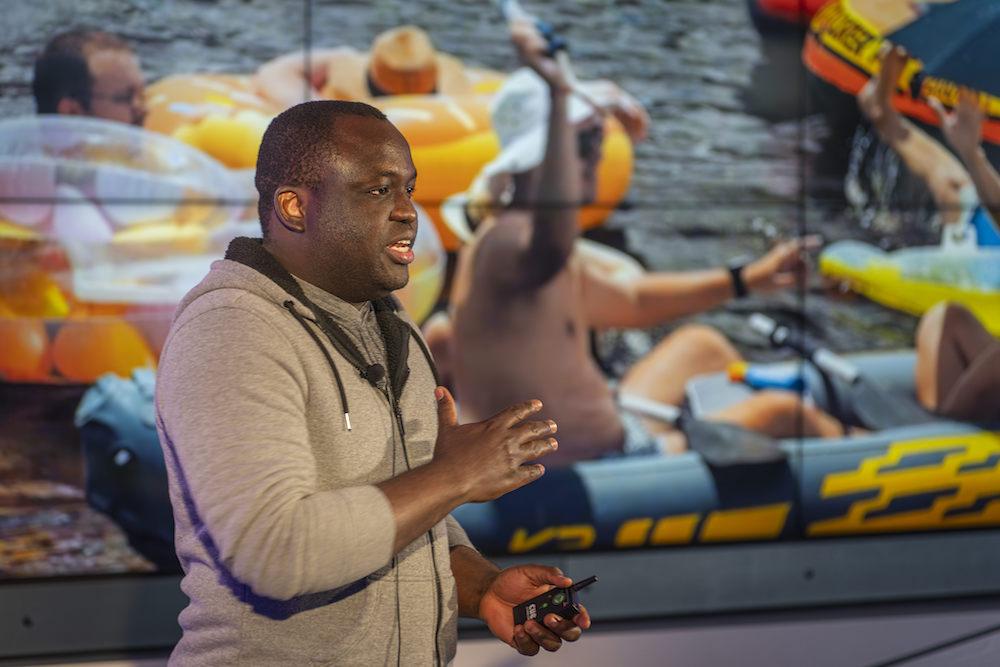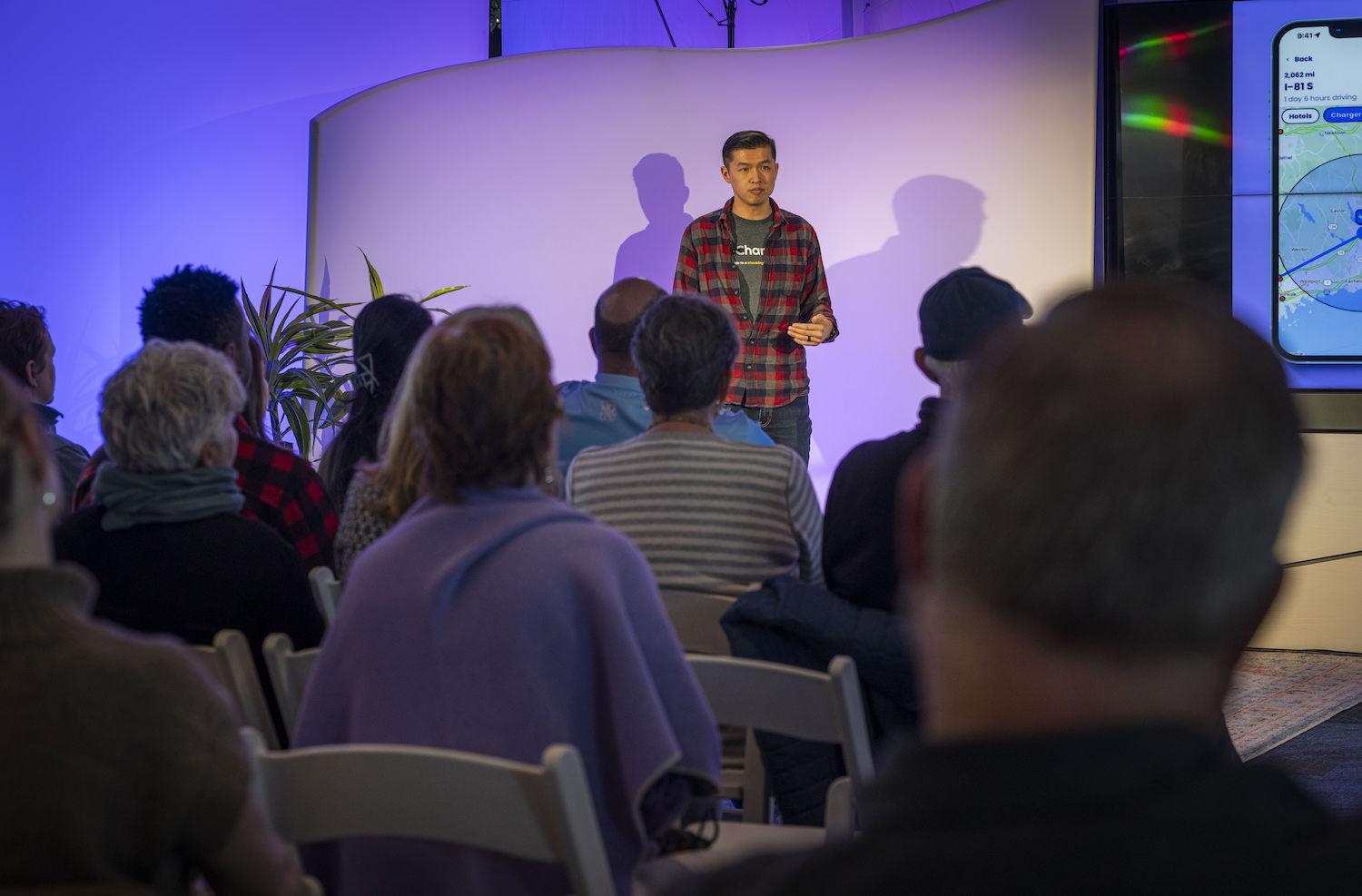Startups Pitch Their Ideas at the Founder Residency’s Venture Showcase
On the last day of February, entrepreneurs, investors, government officials, students, and industry partners came together in the amphitheater at Northeastern University’s Roux Institute to catch a glimpse of the future.
The event was the Venture Showcase, which featured 10 driven founders-in-residence who each had just a few minutes to present the venture they’ve been working on over the last six months. These founders are part of the Roux Institute’s Founder Residency program, specifically designed to empower women, people of color, LGBTQ+, and other historically marginalized groups. Since its inception in 2021, the program has supported four cohorts of founders, helping to create a more inclusive entrepreneurship ecosystem in Maine.
As each of the founders pitched their products, a common theme emerged: the power of data, AI, and automation to revolutionize education, industry, and environmental outcomes, both in Maine and on a global scale. Startups like Small Wins Dashboard and ReachMyTeach focused on using data and software to improve outcomes at K-12 schools; EzOut, Sotira, and Videsk presented cutting-edge commerce and customer service solutions; P3RD pitched a patented, sustainable alternative to single-use plastic.

Nneile Nkholise, the founder and CEO of Thola, created a digital platform that automates the compliance process for the agriculture supply chain. Photo by Flatlander Photography
The founders spoke about how the Founder Residency has helped them accelerate their progress. The program gives its participants access to $25k in funding, extensive programming, and connects the founders with mentors, partners, and experts within the Northeastern University network. Through the Roux Institute’s network of Maine industry partners, many of the founders have been able to work directly with businesses like Hannaford and the Portland Food Co-op.
“I genuinely feel everyone I’ve interacted with [in the program] wants to see our business succeed, and I feel a tremendous amount of gratitude to be in an environment like this while trying to get my first venture off the ground,” said Kayvon Touran, co-founder & CEO of Zal.ai, a software that helps organizations cultivate professional development within their workforce.
Helen Cohen, the co-founder and CEO of ReachMyTeach, said the Founder Residency’s programming helped guide her through the challenging process of developing a new business. “There were many things I didn’t know, or felt intimidated by, that the Roux provided context around. I feel more confident in my leadership.”

Perewari Pere is the CEO of Trameter, a travel-tech startup with a platform that can plan a full vacation in 90 seconds or less, based on a traveler’s budget and preferences. Photo by Flatlander Photography
The Founder Residency’s director, Santiago Zindel, explained that the program aims to challenge the status quo, directing much-needed support toward historically underrepresented founders who often face barriers in securing venture capital funding.
“Having a program in Maine that focuses specifically in high-growth technology companies founded by underrepresented founders is a huge step in creating a diverse and equitable entrepreneurship ecosystem in Maine,” said Zindel.
The showcase highlighted the impact the program has on Maine, bringing up-and-coming entrepreneurs and technology to the state, helping to transform it into a thriving hub for groundbreaking innovation. Of the 10 startups in this cohort, 5 are native to Maine, while 5 others came from Boston, Denver, San Francisco, and Santiago, Chile to participate in the year-long program. The founders will spend the final six months of their residency deepening their connections with businesses, partners, and potential customers around Maine and the region.

CEO David Tse pitches his company Chargely, a mobile app that helps EV drivers plan their trips with data-driven recommendations for the best chargers on the road. Photo by Flatlander Photography
P3RD, the startup that has developed an ocean-safe alternative to conventional single-use plastics, has been tapping into Northeastern’s biotechnology resources to continue to develop their product. They’ve set up a wet lab within the Roux Institute that allows them to make samples and bring their products to market faster. They’re also getting help with obtaining future manufacturing grants.
While there’s still a lot of work to be done for these intrepid entrepreneurs, the Venture Showcase gave the cohort good reason to celebrate their progress and share it with a wider community.
“These founders all have the opportunity to make an incredible, positive impact on our communities,” said the Founder Residency’s Program Manager, Grace St. George. “When you support an idea, it has the potential to spark another, enrich the local community, and change our world for the better. We want to encourage our community to get in touch with our founders if there are people or resources that can help their ideas grow.”
For those that missed the Venture Showcase, you can watch the recorded livestream here, and view the program here. If you’d like to get in touch with one of the startups in the Founder Residency, you can do so here.
The Founder Residency is just one of the entrepreneurship programs available through the Roux Institute. Other programs include the Future of Healthcare Founder Residency for health tech startups and the Blue w(AI)ve Accelerator, a blue tech residency program that runs in partnership with the Gulf of Maine Research Institute.